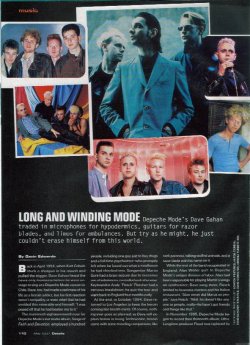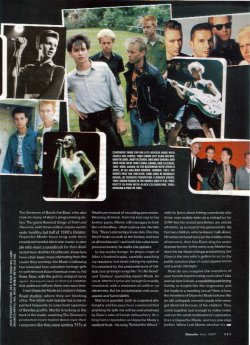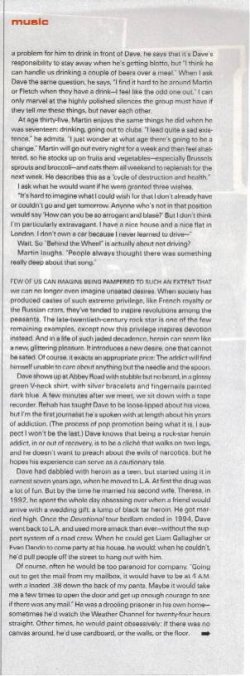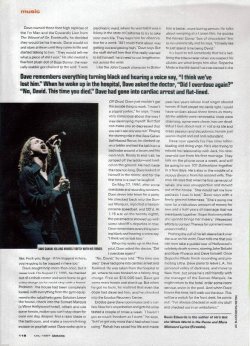- Joined
- Aug 15, 2019
- Messages
- 7,493
- Reaction score
- 143
- Points
- 63
Long And Winding Mode
[Details, May 1997. Words: Gavin Edwards. Pictures: Various.]




Depeche Mode’s Dave Gahan traded in microphones for hypodermics, guitars for razor blades, and limos for ambulances. But try as he might, he just couldn’t erase himself from this world.
Back in April 1994, when Kurt Cobain stuck a shotgun in his mouth and pulled the trigger, Dave Gahan heard the news only moments before he went onstage to sing at a Depeche Mode concert in Chile. Dave, too, had made a sad mess of his life as a heroin addict, but his first reaction wasn’t sympathy, or even relief he had avoided this miserable end himself: “I was pissed off that he had beaten me to it.”
The mammoth eighteen-month tour for Depeche Mode’s latest studio album, Songs Of Faith And Devotion, employed a hundred people, including one guy just to buy us drugs and a full-time psychiatrist – who promptly left when he found out what a madhouse he had checked into. Songwriter Martin Gore had a brain seizure due to excessive use of substances, controlled and otherwise. Keyboardist Andy “Fletch” Fletcher had a nervous breakdown; he quit the tour and went back to England four months early.
At the end, in October 1994, Dave returned to Los Angeles to keep the heroin coming like breath mints. Of course, nothing ever goes as planned; as Dave will explain below in living technicolour, heroin came with some travelling companions, like rank paranoia, talking stuffed animals, and a razor blade with his name on it.
While the rest of the band recuperated in England, Alan Wilder quit. In Depeche Mode’s unique division of labour, Alan had been responsible for playing Martin’s songs on synthesizer; Dave sang them, Fletch tended to business matters and his Italian restaurant. “Alan never did like us as people,” says Fletch. “Well, he doesn’t like anyone as people, really – he hasn’t got friends and things like that.” [1]
In November 1995, Depeche Mode began to record their thirteenth album, Ultra. Longtime producer Flood was replaced by Tim Simenon of Bomb The Bass, who also took on many of Alan’s programming duties. The guitar-flavoured Songs Of Faith And Devotion sold three million copies worldwide: healthy, but half of 1990’s Violator Depeche Mode have long sold their moody-yet-tuneful electronic music to people who want a soundtrack for their disaffected lives. And like Deadheads, those fans have often been more interesting than the music they worship: the Mode’s following has stretched from suburban teenage girls to well-dressed Asian-American men to Axl Rose. Now, with the guitars stripped away again, the band mean to find out whether that audience will join them one more time.
I visit Depeche Mode at London’s Abbey Road studios, where they are finishing Ultra. The white wall outside has to be repainted frequently to cover fresh tapestries of Beatles graffiti. Martin is lurking at the back of the studio, watching Tim Simenon’s production team hunker down over their computers like they were landing 747s at Heathrow instead of recording percussion. Wearing all black, from his knit cap to his leather pants, Martin still manages to look like a schoolboy – albeit a pervy one. He tells Tim, “There’s microchips in our skin. One day they’ll make us walk to the factory and turn us all into biscuits – and with that cybertastic pronouncement, he walks me upstairs.
In the studio lounge, he plays a tape of Ultra’s finished tracks, carefully watching my reactions, but never asking my opinion. I’m surprised by the preponderance of ballads, but up-tempo songs like “It’s No Good” and “Useless” sound like classic Mode. As usual, Martin’s lyrics are straightforwardly emotional, with a minimum of artifice – or cleverness. But he compensates with sonic appeal and hummability.
Martin is guarded, both as a general philosophy and because he is convinced that anything he tells me will be overwhelmed by Dave’s tales of heroin debauchery. He’s long had a reputation as Depeche Mode’s resident freak – his song “Behind The Wheel”, with its lyrics about letting somebody else drive, was widely seen as a metaphor for S/M – but his sexual proclivities are strictly off-limites, as is most of his personal life. He has two children, who he doesn’t talk about. He writes tortured lyrics (in the middle of the afternoon), then has Dave sing his melodramas for him. In the same way, Martin has done his fair share of drugs and partying, but Dave is the one who’s gotten to act in the public passion play of court appearances and suicide attempts.
How do you imagine the members of your favourite band treating each other? Like eternal best friends, a squabbling-yet-loving family, or maybe like the ringmaster and the freaks in a travelling circus? Here is how the members of Depeche Mode behave, like an old, unhappily married couple who never got divorced because of the children. They come together just enough to make music and run the small multinational corporation that is Depeche Mode, and not one step further. When I ask Martin whether it’s a problem for him to drink in front of Dave, he says that it’s Dave’s responsibility to stay away when he’s getting blotto, but “I think he can handle us drinking a couple of beers over a meal”. When I ask Dave the same question, he says, “I find it hard to be around Martin or Fletch when they have a drink – I feel like the odd one out.” I can only marvel at the highly polished silences the group must have if they tell me these things, but never each other.
[Details, May 1997. Words: Gavin Edwards. Pictures: Various.]
A detailed and engrossing piece, not the best I've seen but better than many, focussing mainly on Dave's problems. The piece is noticeably marred by the writer adopting a rather ironic, seen-it-all-before tone in places, which doesn't exactly treat the subject with the tact it deserves. Some interesting bits in there though, if you have the stomach.
" Playing the starring role in the Dave Gahan Self-Hatred Revue, he climbed up on a ladder and tied the belt from a bathrobe around a beam and his own neck. Ready to end it all, he jumped off the ladder – and landed on the ground. He had made the rope too long. Dave looked at himself in the mirror, and for the first time in a year he laughed. "
Many thanks to Michael Rose for kindly supplying a scan of this article.




Depeche Mode’s Dave Gahan traded in microphones for hypodermics, guitars for razor blades, and limos for ambulances. But try as he might, he just couldn’t erase himself from this world.
Back in April 1994, when Kurt Cobain stuck a shotgun in his mouth and pulled the trigger, Dave Gahan heard the news only moments before he went onstage to sing at a Depeche Mode concert in Chile. Dave, too, had made a sad mess of his life as a heroin addict, but his first reaction wasn’t sympathy, or even relief he had avoided this miserable end himself: “I was pissed off that he had beaten me to it.”
The mammoth eighteen-month tour for Depeche Mode’s latest studio album, Songs Of Faith And Devotion, employed a hundred people, including one guy just to buy us drugs and a full-time psychiatrist – who promptly left when he found out what a madhouse he had checked into. Songwriter Martin Gore had a brain seizure due to excessive use of substances, controlled and otherwise. Keyboardist Andy “Fletch” Fletcher had a nervous breakdown; he quit the tour and went back to England four months early.
At the end, in October 1994, Dave returned to Los Angeles to keep the heroin coming like breath mints. Of course, nothing ever goes as planned; as Dave will explain below in living technicolour, heroin came with some travelling companions, like rank paranoia, talking stuffed animals, and a razor blade with his name on it.
While the rest of the band recuperated in England, Alan Wilder quit. In Depeche Mode’s unique division of labour, Alan had been responsible for playing Martin’s songs on synthesizer; Dave sang them, Fletch tended to business matters and his Italian restaurant. “Alan never did like us as people,” says Fletch. “Well, he doesn’t like anyone as people, really – he hasn’t got friends and things like that.” [1]
In November 1995, Depeche Mode began to record their thirteenth album, Ultra. Longtime producer Flood was replaced by Tim Simenon of Bomb The Bass, who also took on many of Alan’s programming duties. The guitar-flavoured Songs Of Faith And Devotion sold three million copies worldwide: healthy, but half of 1990’s Violator Depeche Mode have long sold their moody-yet-tuneful electronic music to people who want a soundtrack for their disaffected lives. And like Deadheads, those fans have often been more interesting than the music they worship: the Mode’s following has stretched from suburban teenage girls to well-dressed Asian-American men to Axl Rose. Now, with the guitars stripped away again, the band mean to find out whether that audience will join them one more time.
I visit Depeche Mode at London’s Abbey Road studios, where they are finishing Ultra. The white wall outside has to be repainted frequently to cover fresh tapestries of Beatles graffiti. Martin is lurking at the back of the studio, watching Tim Simenon’s production team hunker down over their computers like they were landing 747s at Heathrow instead of recording percussion. Wearing all black, from his knit cap to his leather pants, Martin still manages to look like a schoolboy – albeit a pervy one. He tells Tim, “There’s microchips in our skin. One day they’ll make us walk to the factory and turn us all into biscuits – and with that cybertastic pronouncement, he walks me upstairs.
In the studio lounge, he plays a tape of Ultra’s finished tracks, carefully watching my reactions, but never asking my opinion. I’m surprised by the preponderance of ballads, but up-tempo songs like “It’s No Good” and “Useless” sound like classic Mode. As usual, Martin’s lyrics are straightforwardly emotional, with a minimum of artifice – or cleverness. But he compensates with sonic appeal and hummability.
Martin is guarded, both as a general philosophy and because he is convinced that anything he tells me will be overwhelmed by Dave’s tales of heroin debauchery. He’s long had a reputation as Depeche Mode’s resident freak – his song “Behind The Wheel”, with its lyrics about letting somebody else drive, was widely seen as a metaphor for S/M – but his sexual proclivities are strictly off-limites, as is most of his personal life. He has two children, who he doesn’t talk about. He writes tortured lyrics (in the middle of the afternoon), then has Dave sing his melodramas for him. In the same way, Martin has done his fair share of drugs and partying, but Dave is the one who’s gotten to act in the public passion play of court appearances and suicide attempts.
How do you imagine the members of your favourite band treating each other? Like eternal best friends, a squabbling-yet-loving family, or maybe like the ringmaster and the freaks in a travelling circus? Here is how the members of Depeche Mode behave, like an old, unhappily married couple who never got divorced because of the children. They come together just enough to make music and run the small multinational corporation that is Depeche Mode, and not one step further. When I ask Martin whether it’s a problem for him to drink in front of Dave, he says that it’s Dave’s responsibility to stay away when he’s getting blotto, but “I think he can handle us drinking a couple of beers over a meal”. When I ask Dave the same question, he says, “I find it hard to be around Martin or Fletch when they have a drink – I feel like the odd one out.” I can only marvel at the highly polished silences the group must have if they tell me these things, but never each other.
[1] - Hmm, while in the Ultra era the band members did sometimes remark on Alan's introverted and aloof character, I've never heard them drop into anything like this degree of spite, and Fletch in particular usually strives to be far more diplomatic. I could be wrong, but I'd like to give them the benefit of the doubt and think that maybe there's been something of a misquote here.
